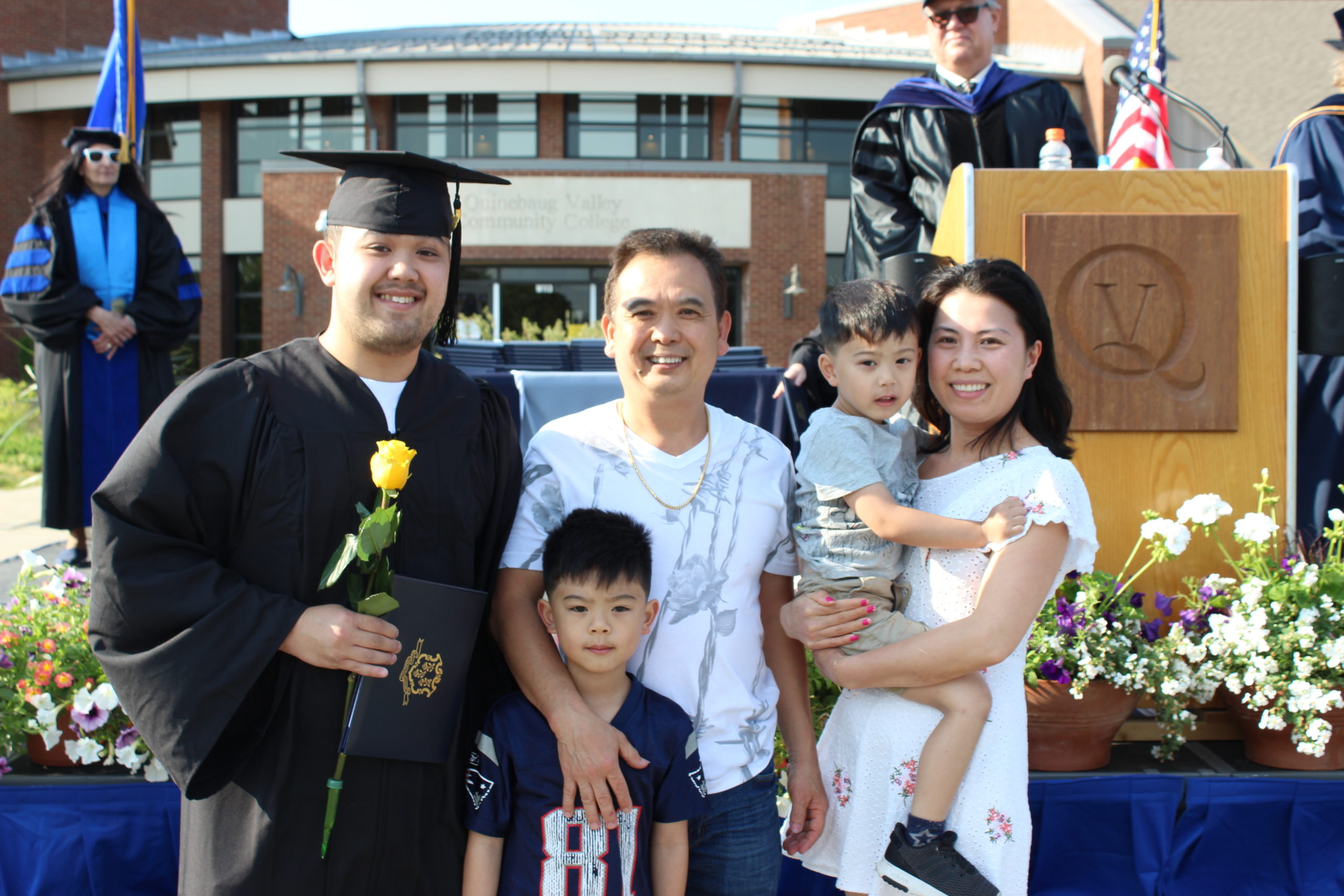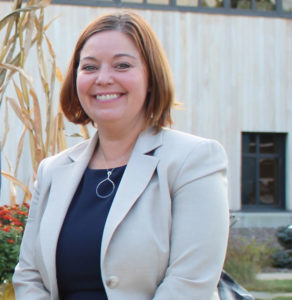Mission Statements
Strategic Goals and Priorities

Colleagues,
Informed by the completion of our self-study and based on the input of faculty, staff, students, and community, Quinebaug Valley Community College presents its strategic plan for 2022- 2027, outlining our goals and priorities for the next five years in alignment with the soon to be formed Connecticut State Community College (CSCC). This plan is bold and once implemented will position the college for a prosperous future.
From our humble beginnings at Ellis Technical High School in 1971, to our current day sprawling campus in Danielson and our branch location in Willimantic, QVCC has been a staple in Windham County, advancing the economic trajectory of our students and their families by providing a comprehensive array of academic programs aligned to our regional labor market needs.
Our diverse study body have varied lived experiences. Many of our students are the first in their families to go to college and work full-time while going to school. Others have served our nation proudly as members of our military. Some are also raising their families or actively serving as caregivers. Our students come from a continuum of ages and life stages, from our high school partnership students– to our traditional-aged students, to the adult learner, to our senior citizens who are part of our Learning in Retirement(LiR) program. QVCC meets our learners where they are and provides them the resources and support to achieve their educational and career goals.
As we commence this plan, the college, our community, and our nation are in the midst of significant transformation under the perfect storm of circumstances. The world is in the second year of an international health crisis with no quick end in sight. In light of the ongoing isolation and loneliness that accompanied the pandemic, we continue to face another epidemic around mental health and access to high-quality care. According to a national study, one in five are suffering anxiety, depression, or another form of mental health issue.
The Northeastern region of the United States, including Windham County, Connecticut, continues to see a declining population, which began in 2011. A decade later, the region sees smaller numbers of students in the K-12 school system with an increasing percentage of ethnically, linguistically, and culturally diverse populations comprising the traditional higher education population pipeline.
The country is divided along with political extremes. We are experiencing unprecedented labor and supply chain limitations. The great resignation has begun leaving many jobs regardless of required training and skill level unfilled. The labor shortage coupled with the national shipping and trucking crises is resulting in historic levels of inflation and shortages on basic needs.
In the wake of several high-profile murders of black individuals and the wave of anti- Asian sentiment in the wake of COVID, a national spotlight was raised regarding systemic racial inequities and discrimination. People from all walks of life united nationally to bring attention to the need for change and a call for a laser focus on equity ensued.
Community colleges across the nation have seen a decade-long decline in enrollment. At QVCC alone, we have seen our enrollment decline by fifty percent in the last decade. In the last three years, over 570 colleges and universities have closed their doors or merged as a result of declining enrollment and strained budgets. In fact, QVCC is in the midst of the planned merger of the 12 independent public community colleges of Connecticut into one singularly accredited institution of Connecticut State Community College scheduled for 2023.
With high levels of uncertainty, the onset of COVID, the mental health crisis, the move to more online operations, increasing racial tensions, and the constant hiring crisis in higher education, faculty, and staff morale are at times challenged.
Our faculty, staff, and students are resilient. Our community is engaged and extremely supportive of the mission of our college and the need for our very existence. Throughout our history, we have benefited from the tremendous support and generosity of our Foundation and Regional Advisory Council. With this strategic plan, our college’s future is bright and vibrant. We will emerge from the COVID pandemic and the merger to become part of the Connecticut State Community College, stronger and more able to provide the resources and support for our students to experience a premier higher education.
 Sincerely,
Sincerely,
Karen Hynick, Ed.D
QVCC Chief Executive Officer
To prepare for these significant shifts in the evolution of our college and ensure quality service to our students and our community, the following strategic goals and priorities have been identified to frame our anticipated focus areas in the next five years in alignment with the transition to the one college concept.
Definition
Equity is the removal and reduction of barriers that negatively impact student success within structures, policies and practices and ensuring that students receive targeted resources and supports to achieve their academic, professional, and personal goals. Equity is achieved by identifying and intentionally addressing structural racism, systemic poverty and other forms of marginalization, upholding the expectation that administrators, faculty and staff act as anti- racist institutional change agents.
Statement & Pillars
CT State Community College commits to bold and disruptive change by actively:
- identifying, naming, and dismantling structural racism, systemic poverty, and other barriers;
- establishing equitable and anti-racist policies and practices; and
- empowering students, faculty, staff, and administrators to advance racial, social, and economic justice.
Our core collective responsibility is to continuously assess practices and policies and transform the world we live in by eliminating inequities. The strategy we use to galvanize our dedication to our community’s success has seven pillars:
Recruitment, Hiring, and Talent Development
We recruit and enlist talent to our teams whose passion, talent, energy, and diverse experiences are beneficial to the work and lives of our students, faculty, staff, and administrators. We invest system-wide fiscal, institutional, and personnel resources in professional learning programming and opportunities by and for administrators, faculty, and staff to develop and support equity-minded practice competencies that are job-embedded, tied to performance evaluations, and sustainable.
Collective Leadership
Our commitment to diversity, equity, inclusion, parity, and student success spans across our campuses and throughout our classrooms, offices, cabinets, and boards. We actively and collaboratively work in pursuit of a just and equitable world. We further demonstrate our commitment to Diversity, Equity, and Inclusion (DEI) by upholding equity-minded practices in every aspect of our policy and curriculum design and implementation, management, business processes, and daily interactions with all community members.
We hold a public commitment and invitation for accountability to ensure our programs, certificates, services, and offerings allow the communities we serve to flourish.
Cultural Competence
We invest in professional learning opportunities that build upon each campus community member’s cultural competence, one’s ability to respectfully engage with individuals whose backgrounds and beliefs are different than ours. This requires strengthening culturally affirming awareness of self and reflection on social position, privilege, power, (dis)advantages while seeking out the perspective of others to increase our sound decision-making ability that recognizes the strength of diversity, reduces traditional exclusionary practices, and propels us toward an environment of inclusion.
Innovation
We drive disruptive innovation that creates an intentional culture and climate where the impact of policies, procedures, and practices are continuously assessed by dis-aggregated data trends and holistic student success indicators. The findings from these assessments inform our choices and actions at every level of campus operations and services.
Advocacy
We advocate for the interruption of practices that hinder equitable and inclusive opportunities, by leveraging our powerful position as one community college in CT to identify and address the extreme economic, health, and educational disparities that impede our students’ success. We demand movement on policy that increases financial and educational resources that meet our students’ holistic needs by using our platforms and voices to sponsor legislation, champion community action, and lead institutional efforts to achieve systemic equality.
Assessment and Reflection
We engage in continuous robust personal, departmental, and institutional assessment and reflection to ensure that all established policies and practices are anti-racist, close existing equity gaps, and support social mobility by making disaggregated quantitative and qualitative data, as well as key performance indicators, accessible and actionable to all to improve student outcomes particularly for low-income and racially minoritized populations.
